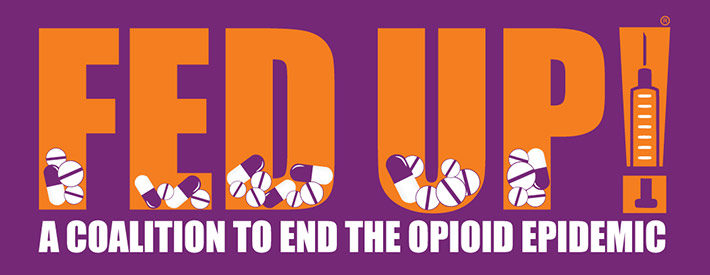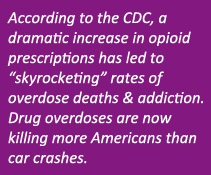We urge your organization to join this initiative in solidarity with FED UP!. To sign the letter displaying your support, please email John McCally [email protected] with your organization’s name, city and state. Deadline to sign the letter is extended to Friday, August 28th at 6 PM CST.
Re: Justice for Victims of the Opioid Crisis
Dear Attorney General Barr:
On behalf of dozens of organizations and millions of families devastated by the opioid crisis, we write in hope of obtaining justice for the victims of opioid industry executives.
A federal judge presiding over hundreds of county and state cases against opioid manufacturers and distributors recently stated: “It is accurate to describe the opioid epidemic as a man-made plague, 20 years in the making.”[1] This man-made plague was created by the opioid industry—the companies that manufacture, and distribute prescription opioids. The President’s Commission on Combatting Drug Addiction and the Opioid Crisis also pointed to the role played by opioid manufacturers and distributers in causing the opioid crisis, highlighting as causes the “aggressive promotion of [OxyContin],” an industry campaign to treat pain like “the Fifth Vital Sign,” and “unrestrained distributors.” [2] Of note, the opioid industry continues to impede efforts to reduce the supply of opioids. As the President’s Commission observed “To this day, the opioid pharmaceutical industry influences the nation’s response to the crisis,” citing front group opposition to the CDC opioid guideline as but one example.
While we are encouraged by reports that the Department is pursuing $18.1 billion in penalties from Purdue Pharma after uncovering evidence of criminal and civil misconduct,[3] we urge the Department of Justice to hold members of the Sackler family and other Purdue executives personally responsible for their criminal acts in furtherance of their company’s wrongdoing.
We further urge the Department to pursue criminal charges against executives from other companies who, like the Sacklers, broke the law in their pursuit of profit and took actions that harmed millions of Americans. Senior executives from AmerisourceBergen, Cardinal Health, Endo Pharmaceuticals, Johnson & Johnson, Mallinckrodt, McKesson, Teva (Cephalon) and other companies, must be brought to justice as individuals.
An important lesson from the opioid crisis is that fines and settlements paid by opioid manufacturers and distributors are not an adequate deterrence. It is clear from their actions that the individuals controlling these companies see fines and settlements as the cost of doing business. For example:
- In 2007, Purdue Pharma was fined $634.5 million for its deceptive marketing campaign. Had members of the Sackler family been held individually accountable for Purdue’s wrongdoing in 2007, they would likely have refrained from engaging in a criminal kickback scheme with an electronic health records vendor.[4] And criminal action taken against the Sacklers would likely have deterred other opioid industry executives from engaging in similar behavior.
- In 2007 and 2008, AmerisourceBergen, Cardinal Health and McKesson were held liable and fined by the Department of Justice for improperly distributing opioids. If senior executives had been held individually accountable for their illegal and reckless behavior, their companies would likely have changed their ways.[5] Instead, they would continue to break the law year after year, continue to pay fines, and continue to flood states and counties with hundreds of millions of opioid pills.
- In 2008, Teva (Cephalon) was convicted for committing a felony and paid $425 million in criminal and civil penalties for off-label marketing of its fentanyl lollipop (Actiq) but the executives responsible for the company’s criminal behavior were never charged or fined.[6] Had the bad actors been prosecuted, Teva would likely not have repeated the exact same criminal behavior with its off-label marketing of a fentanyl lozenge (Fentora) and Insys would likely have been deterred from bribing doctors to prescribe its fentanyl spray (Subsys) off-label.[7]
- In 2009, Johnson and Johnson (J&J)was caught violating federal law by downplaying the risks of tramadol (Ultram ER).[8] In 2011, J&J was again caught downplaying opioid risks.[9] Had J&J’s executives been held personally accountable, their company’s improper marketing of opioids would likely have ceased. Instead, J&J would continue to improperly promote its opioid products and fund front groups that downplayed opioid risks.[10]
It is important to recognize that the actions described above led to millions of cases of opioid addiction and more than 500,000 deaths since 1999. While families emptied their bank accounts seeking treatment for their loved ones, executives responsible for the opioid crisis have acted with impunity and accrued immense wealth.
The trajectory of the opioid crisis would likely have been far less severe if, from the beginning, opioid industry executives were prosecuted for the actions they took that led to addiction and death. But it is not too late to act. On behalf of the millions of victims of the opioid industry, we urge the Department of Justice to hold these individuals accountable to the fullest extent of the law.
Sincerely,
[1] Feeley J. Opioid-industry claims proceed as judge cites “man-made plague.” Bloomberg News. December 20, 2018. https://www.bloomberg.com/news/articles/2018-12-20/opioid-industry-claims-proceed-as-judge-cites-man-made-plague.
[2] Cite
[3] Randazzo S. Justice Department Seeks as Much as $18.1 Billion From Purdue Pharma. Wall Street Journal. August 4, 2020.
[4] Spector M, Hals T. Exclusive: OxyContin maker Purdue is ‘Pharma Co X’ in U.S. opioid kickback probe. Reuters. January 28, 2020.
[5] Drug Topics, DEA hits third Cardinal Health distribution center, December 21, 2007, available at https://www.drugtopics.com/pharmacy/dea-hits-third-cardinal-health-distribution-center. Drug Topics, Cardinal caught between DEA and pharmacies over diversion control, April 14, 2008, available at https://www.drugtopics.com/community-practice/cardinal-caught-between-dea-and-pharmacies-over-diversion-control. May 2, 2008 Settlement and Release Agreement and Administrative Memorandum of Agreement between DEA and McKesson Corporation, available at https://www.dea.gov/sites/default/files/2018-06/Pharmaceutical%20Agreements%20-%20McKesson%20-%202008_0.pdf.
[6] https://www.justice.gov/archive/opa/pr/2008/September/08-civ-860.html
[7] https://www.justice.gov/usao-ma/pr/founder-and-former-chairman-board-insys-therapeutics-sentenced-66-months-prison
[8] Letter from FDA to William Weldon, Chairman of the Board and Chief Executive Officer
Johnson & Johnson, RE: NDA# 21-692, ULTRAM® ER (tramadol HCl) Extended-Release Tablets. MACMIS # 17464;
[9] Letter from FDA to Roxanne O. McGregor-Beck RE: NDA # 022304 NUCYNTA® (tapentadol) immediate-release oral tablets C-II MA # 147
[10] Hoffman J. Johnson & Johnson ordered to pay $572 million in landmark opioid trial. New York Times. August 26, 2019. https://www.nytimes.com/2019/08/26/health/oklahoma-opioids-johnson-and-johnson.html.







